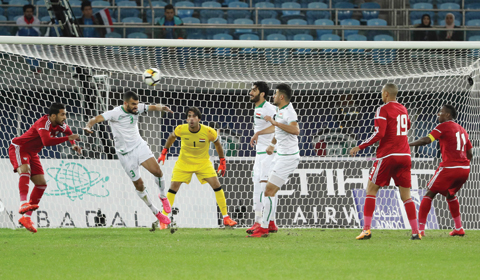Own goal downs Bahrain - Iraq pay the penalty
 KUWAIT: UAE's Mohammed Marzooq (2L) attempts a shot at goal during the 2017 Gulf Cup of Nations semi-final football match between Iraq and UAE at the Sheikh Jaber al-Ahmad Stadium in Kuwait City yesterday. -- Photo by Yasser Al-Zayyat
KUWAIT: UAE's Mohammed Marzooq (2L) attempts a shot at goal during the 2017 Gulf Cup of Nations semi-final football match between Iraq and UAE at the Sheikh Jaber al-Ahmad Stadium in Kuwait City yesterday. -- Photo by Yasser Al-ZayyatKUWAIT: Oman will square off against the UAE in the 23rd Arabian Gulf Cup final after the teams beat Bahrain and Iraq respectively in the semifinals played yesterday at Jaber Al-Ahmad International Stadium. The finale, set for Friday, will be a rematch of their group stage encounter, which ended with a 1-0 victory for the Emiratis.
UAE and Iraq, playing in front of 25,538 fans, failed to score in regular and extra time, ultimately settling for penalty shootouts, which UAE won 4-2. Iraq seized the momentum to begin the game, setting the tone early with their fast-paced approach. However, they failed to translate this pressure into real scoring opportunities. “We were close to winning, but we couldn’t take advantage of our chances,” said Iraq’s coach Bassem Hamdan, who praised his players for putting up a “good match”. “It was a very tough match,” UAE coach Alberto Zaccheroni said. “Iraq fought till the very end.”
The UAE defense struggled early to contain Iraq’s offense, but eventually managed to slow the pace down near the end of the first half. The roles reversed in the second half, however. “Iraq changed their game formation from 4-4-2 in the group stage to 4-3-3, which enabled them to control play in centerfield,” Zaccheroni said. “But we played with balance… and played better in the second half.”
 KUWAIT: Oman's Harib al-Saadi (front) and Fahmi Said Rajab Dubein fight for the ball against Bahrain's Sayed Baqer during the 2017 Gulf
KUWAIT: Oman's Harib al-Saadi (front) and Fahmi Said Rajab Dubein fight for the ball against Bahrain's Sayed Baqer during the 2017 GulfCup of Nations semi-final football match between Oman and Bahrain
at the Sheikh Jaber al-Ahmad Stadium in Kuwait City yesterday. – AFP
Earlier, Oman advanced to the finals after beating Bahrain 1-0 in front of 22,795 spectators. Oman controlled the pace of play in the first half, but much of their early offense presented no real pressure to the Bahraini net. The story changed after 20 minutes of play, as Oman picked up their offensive intensity, which yielded an own goal nine minutes later by Bahrain’s Mahdi Abdul-Jabbar.
Oman controlled the pace of play to end the first half. Bahrain came in the second half determined to score, piling pressure on the Omani net, but to no avail. Their last chance came in the 88th minute when Abdullah Omar fell in the penalty area after appearing to make contact with an Omani defender, but no call was made.
Oman’s coach Peter Verbeek said that he was very proud of his players, but admitted that his team have played better games during the tournament. “We were not so much in control as we were in the previous three matches,” he said, adding that Bahrain’s play in the second half which focused on long passes to its tall strikers presented some problems for his team. “It was not the plan to go back in our own half, but because of the way in which they started to play, we had to go back more than we normally do… But I think defensively, we were well-organized.”
Verbeek mentioned a survey published in the Omani press in which 70 percent of respondents said Oman had no chance to advance in the tournament. “However, we’re in the finals at the moment. So I think we’ve proved something.”
Bahrain’s coach Miroslav Soukup was defiant after the match, proclaiming that he did not feel that his team lost a match in the tournament, given that their only loss came as a result of an own goal. “I have respect for my team,” he said at the press conference. “We were much better in the second half, and my team fought till the last second to score.” Both the coaches affirmed the tournament presented a good opportunity to prepare for the Asian Cup next year.
By Ahmad Jabr










